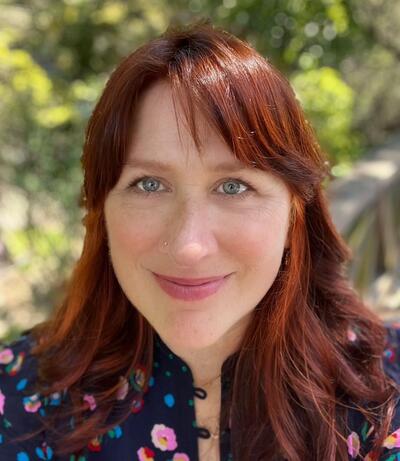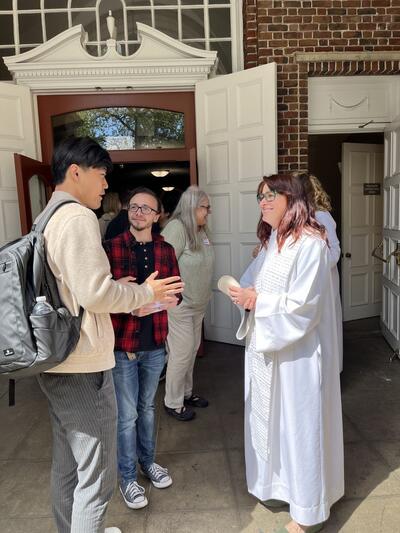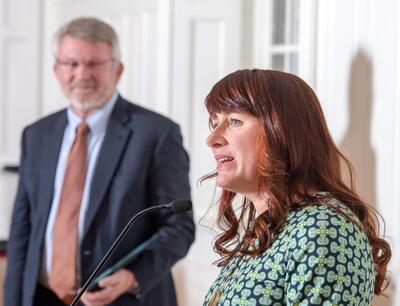Molly Baskette ’96 M.Div. knows something about grief and dread. She’s had cancer. Her brother was murdered. She’s battled anxiety. Her church burned down. She’s walked with citizens who are in dire hardship because of heartless public policies. She’s watched Christianity decline as a cultural force in a very divided America.
 But hold on—despair is not an option, says Baskette, Co-Senior Minister of First Church Berkeley UCC in California: Despair is an abdication of the power we do have. She still believes in God, resilience, humor. And church camp.
But hold on—despair is not an option, says Baskette, Co-Senior Minister of First Church Berkeley UCC in California: Despair is an abdication of the power we do have. She still believes in God, resilience, humor. And church camp.
“I’m New England congregationalist to the core,” she said recently. “I’ve been going to church since I was four, been a pastor since I was twenty-six. I’m a church camp kid—it’s the closest I’ve ever gotten to the love of Jesus Christ, and it made me who I am. I don’t know what’s next for churches, but I’m positive Christianity isn’t dying. The message and person of Jesus is too compelling to die.”
This is no time to cave in to despondency: the Christian faith has work to do, she said.
“We can’t die! We have a job to do. This includes giving an alternative interpretation of the sacred texts at a time when Christian nationalism is ascendent. We better do that job. If we want to retire and just go walking in the woods, great, but not now!”
Baskette is an irrepressibly loyal UCC minister and a beloved author. Her book titles capture something of her high spirits and theology, including Real Good Church: How Our Church Came Back from the Dead, and Yours Can, Too (Pilgrim Press, 2014) and How to Begin When Your World is Ending: A Spiritual Field Guide to Joy Despite Everything (Broadleaf Books, 2022). The latter includes her account of a lung cancer diagnosis in 2010, the harrowing treatments, and the restoration of her health.
Repairing a wounded world
She is a person of gospel faith, political activism, and salty candor. Her voice carries urgency when she talks about today’s fraught politics, the emotional and physical cost that vulnerable people pay in a strained, volatile culture. She preaches avidly from scripture, lately about the flawed kings of biblical history, the Bible’s warning against making idols of feckless human leaders. She wants churchgoers to seize their own daily potential as the body of Christ, be emotionally honest with each other, and work to repair the embattled world.
“I believe wisdom arises from the Holy Spirit, with all of us working together despite our differences to create something beautiful. I think that’s directly applicable to the American enterprise.”
Pain is a great motivator for change, she says. But in a society of vast inequalities the people who aren’t in personal economic or existential crisis need to be pushed to advocate for the changes society need to make.
“I’m a white cis upper-class person with two Ivy League degrees,” said Baskette, a Dartmouth College graduate. “We who have privilege must step into the breach and fight like hell for others the best we can, whether it’s at a neighborhood level or a policy level, whether taking to the streets, organizing, bringing soup, or helping people be seen, heeding their signals if they are hurting.”
Baskette grew up around Hartford, Conn.—churchgoing was a rescue from a sometimes-difficult childhood. Her experience imprinted on her just how good-hearted churches can be and why the world needs them so badly.
“I was a kid who was different, who was bullied, who was weird, who was poor. But our small congregation was filled with loving people and pastors. Great youth leaders put on plays, and I found my love of theater there. So I had very little religious trauma in my upbringing! I’m really grateful for that.”
The words “church camp” light up her face.
“My sister and I were sent to church camp because my mom wanted a break as a depressed single mother. I thought, great, a whole new social situation that I can fail in! But I went, and within two days I made one of the best friends of my life (who is still a best friend), and it was my birthday—my 13th—and she bought me a Snickers bar and camp t-shirt. I went back as a camper the next year, then back again on staff.”
Camp is where she first learned leadership skills. It’s where she heard the call to ministry one stormy night. It’s where she had her first kiss. It’s where she first saw the power of Christian community. “It gave me myself, and it’s still doing that. It does that for a lot of people.”
Ministers are not saviors
The challenges of 21st century leadership are much on her mind. She’s concerned about the high rate of pastors who left the ministry during Covid or afterward, often for their own mental health. She understands and respects the reasons for that, including the exhaustion of managing congregational conflict. But there’s something to be said for perseverance.
 “I admit I’m sometimes jealous of those people who walk away,” said Baskette, who was minister at two churches in New England before her move to the Berkeley congregation in 2016. “There are probably 14 different moments when I felt like that. But it’s not in my nature to walk away. That doesn’t make me a better person—it’s just the way I’m constructed. I’m super stubborn. Part of me knows that it’s in staying and working through conflicts that we can actually heal. If we lovingly work through it, our congregations get to heal, we get to heal, maybe even the world gets to heal a little bit. If you leave you don’t get to repair after the rupture. I’ve worked through conflicts at three churches now and I can tell you it’s blessed me and I hope it has blessed them. That’s what repair is: we disagree but we still love each other. We have a relationship. We can be in the same pew, the same church. We actually need each other—maybe we can make each other better and stronger. Even if there’s always going to be a scar, repair is communion, holy communion.”
“I admit I’m sometimes jealous of those people who walk away,” said Baskette, who was minister at two churches in New England before her move to the Berkeley congregation in 2016. “There are probably 14 different moments when I felt like that. But it’s not in my nature to walk away. That doesn’t make me a better person—it’s just the way I’m constructed. I’m super stubborn. Part of me knows that it’s in staying and working through conflicts that we can actually heal. If we lovingly work through it, our congregations get to heal, we get to heal, maybe even the world gets to heal a little bit. If you leave you don’t get to repair after the rupture. I’ve worked through conflicts at three churches now and I can tell you it’s blessed me and I hope it has blessed them. That’s what repair is: we disagree but we still love each other. We have a relationship. We can be in the same pew, the same church. We actually need each other—maybe we can make each other better and stronger. Even if there’s always going to be a scar, repair is communion, holy communion.”
It’s a godsend to ministers if they can just keep in mind they are not saviors, she said. She has needed reminding of this herself from time to time. A church—its particular history, DNA, and future—belongs to its people, their hopes and wounds and dreams.
“I think we ministers can dial down 80 percent of our anxiety ourselves if we just remind ourselves daily: this doesn’t depend on me; what matters is deciding what’s the next right action to take,” said Baskette, who was honored with the YDS Alumni Award for Distinction in Congregational Ministry in 2018. “Let me get quiet, take a walk, pray, ask what is mine to do and what is mine not to do. Enlist others and hope they get inspired, and if they don’t then it’s not the right moment.” (She highly recommends the work of the Lombard Mennonite Peace Center for its teaching focus on conflict management and discipleship.)
Anxiety management
She believes ministers and other leaders today must attend to the skill of anxiety management—the “practice of non-anxiety.” She is pursuing instruction in a distinctive mental health practice of an emerging Christian spirituality: she’s apprenticing to be a psychedelic-assisted therapist or psychedelic chaplain, who offers counsel for the use of psilocybin mushrooms to seek more intimate encounters with God or to support well-being. See her Zoom presentation here, which explores the research about it, the risks and benefits, and how these molecules can be helpful not just to individuals with dire mental health diagnoses but to others seeking emotional or spiritual growth.
Her attention to this novel therapy speaks to her openness to new approaches to faith and practice: churches have to find new ways to tell their story, address their traumas, and experience the divine. She believes nevertheless in religious institutions, even as society drifts into skepticism or indifference and as the search for God shifts beyond organized religion, especially with younger generations.
“Young people are done with the hypocrisy, the rigidity they see in church. They’re frustrated with how we in-fight and focus on trivial things. I don’t think they’re cynical. They are idealistic. They hope for things. They haven’t given up at all. They just want us to do better and have more to show for it. As for those who have antipathy to church or don’t believe in God, I tell them there’s still so much value in gathering to sing, to mine sacred texts for meaning, to hold them up to what’s happening day to day, to argue and talk with and support one another—and pray, even if you don’t believe. Praying out loud is a way of cutting our burdens in half, and it amplifies our joy by allowing us to overhear each other’s joy.”
All these practices are crucial, she said—for church and mental health and nation, too. She believes the current period of agonizing divisions will at some point give way to a great reckoning. If “winter is coming,” repair is coming too, she said.
“There will come a moment when culturally and politically the conditions are right for repentance and repair. It’s coming, and that’s hopeful. We’ll need skills for that.”
 In the meantime, she tries “to be really human with my church and my peers and my opposers.” This is the path to honest reconciliation and breakthrough, she said. When it’s time for a challenging conversation, don’t act invulnerable. Don’t be afraid to show cracks. Leaders have to learn how to lower the temperature and create a climate of empathy.
In the meantime, she tries “to be really human with my church and my peers and my opposers.” This is the path to honest reconciliation and breakthrough, she said. When it’s time for a challenging conversation, don’t act invulnerable. Don’t be afraid to show cracks. Leaders have to learn how to lower the temperature and create a climate of empathy.
“I’ve learned as much from my critics as I have from those who are one thousand percent on my side—more, because they drag my shadow out into the sunlight.”
In those moments, she senses a divine presence as well, despite all odds.
“I definitely find God in church, but I also love stumbling upon God in nature, in paradoxical mystical encounters with strangers, in novel experiences and connecting those dots to what we’re doing in church. God isn’t what happens in church each week. It’s the place where we inform one another—remind each other—that God is everywhere.”